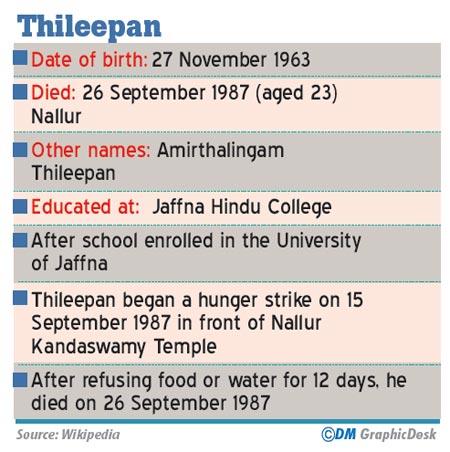27 Sep 2023 - {{hitsCtrl.values.hits}}
| The celebration of martyrdom is a key driver of terrorist recruitment and indoctrination. Don’t let a repetition of the past happen. |
 Commemorating Thileepan in Colombo, a city that had been through hundreds of terrorist attacks during the LTTE’s heydays, is also an affront to the victims of terrorism.
Commemorating Thileepan in Colombo, a city that had been through hundreds of terrorist attacks during the LTTE’s heydays, is also an affront to the victims of terrorism.
 Last week, Tamil National People’s Front (TNPF), which is in stiff competition with the TULF for the Northern Tamil votes, launched a commemoration campaign of Thileepan, a self-styled Lt. Colonel of the LTTE, who died in 1987 while engaging in a hunger strike.
Last week, Tamil National People’s Front (TNPF), which is in stiff competition with the TULF for the Northern Tamil votes, launched a commemoration campaign of Thileepan, a self-styled Lt. Colonel of the LTTE, who died in 1987 while engaging in a hunger strike.
A vehicle procession carrying a life-size idol of Thileepan kicked off from Pottuvil on September 16th when Thileepan started his hunger strike ostensibly against the atrocities of the Indian Peace Keeping Force. It was expected to reach Nallur on September 26th, the day he died.
Reminiscent of the early stage of Tamil nationalist activism, leading up to the growth of Tamil militancy, this latest episode is a catch-and-mouse game, testing the political will of the government, outreach of courts and the patience of the average majority Sinhalese public.
The reaction has been varying. In Vavuniya, the court has rejected a Police request to ban commemoration events. Police claimed they would disrupt peace and racial harmony, but the Judge ruled commemorating the dead is a Fundamental Right. Similar submissions were made at the courts in Mullaitivu and Jaffna. In contrast, the Fort Magistrate’s Court in Colombo issued a ban on events scheduled in Colombo.
In Trincomalee, the procession came under attack from Sinhalese villagers, who assaulted the organizer, MP Selvarajah Kajendren.
In Mannar, posters with warnings to organizers have appeared. Meanwhile, like it is an afterthought, the Attorney General filed charges against former Jaffna MP M.K. Sivajilingam for organizing a similar memorial event for Thileepan at Kondavil in Jaffna in 2020.
 Commemorating the dead vs. celebrating martyrdom
Commemorating the dead vs. celebrating martyrdom
Some folks have expressed self-righteous outrage at the restrictions on commemorating the dead. That is a self-serving over-simplification. Commemorating the dead and orchestrated public celebrations of the martyrdom of dead terrorists are different things and should be handled differently.
Thileepan was the political leader of Jaffna and a leading member of the LTTE, a proscribed terrorist group that led a nihilistic terrorist campaign for two and half decades.
Celebration of martyrdom is a key driver in terrorist recruitment and ideological indoctrination. One could see a similar dynamic in the West Bank and Gaza, Hizballah in Lebanon, and Islamic State and Al Qaeda. But no group had such elaborate and highly ritualistic celebrations of martyrdom as did the LTTE through its detailed week-long ceremonies of fallen fighters.
These elaborate commemorations of martyrdom were a major driver of reinforcing a cult-like behaviour dynamic, which turned the LTTE into the global leader of suicide terrorism until the US invasion of Iraq. The LTTE reclaimed the mantle during the final phase of the Eelam war.
Organizers of the Thileepan commemoration, who themselves are known Tiger apologists, are rekindling that cult-like worship of martyrdom, which led Tamil youth into a zombie sacrifice. Tamil polity had not yet recovered from the devastation brought upon themselves by that misadventure. Unhealed wounds, an understandable outcome of a brutal maximalist campaign, not to mention the government’s half-hearted approach to redress them, would make some of them vulnerable to future recruitment attempts. These events make things easier.
Nationalists’ race to the bottom
Second, the general tendency in the political leadership is to dismiss the overt celebration of LTTE as a political gimmick by the Tamil political parties competing to appear more nationalistic than the other. That could well be the self-interested motive of the organizers. But, if history is any guide, this inter-party competition in Tamil politics, since S. J. V. Chelvanayakam’s split from the ACTC, to appear more nationalistic, more anti-Sri Lankan and more anti-Sinhalese, set in motion a self-reinforcing radicalization process within the Tamil polity, leading to the Vaddukottai Resolution (which was passed with the 1977 general election in mind). Nascent Tamil militancy was tacitly endorsed by the traditional Tamil leadership, and so was its turn into terrorism until the LTTE cannibalized its patrons.
With the TULF, the Tamil political mainstay, facing stiff competition from its splinter groups and new entrants, the same old race to the bottom is coming into play.
Like in the past, escalation is gradual. Also, as in the past, it would pass the Rubicon unbeknownst to the main stakeholders of the campaign. Any government worth its salt should have eyes wide open to this proven dynamic.
Reconciliation or race management?
Third, calls for reconciliation are also bundled with the demand to commemorate the dead. As mentioned earlier, private commemoration of the dead, be it civilian victims or the slain LTTE cadres, is a different matter and should be allowed.
However, when commemorations turned into politically orchestrated celebrations of martyrdom and exude all the rage and nihilistic political ideology of the LTTE and its ideological mentors, it should be handled differently and dispassionately with the national security concerns dictating the approach.
Some folks have lauded Singapore as a model for racial harmony. However, Singapore excels in not exactly racial cohabitation but racial/ ethnic management with the help of strict government measures and clearly demarcated redlines. Probably, that is an approach that the government should explore in relation to race relations in Sri Lanka.
Fourth, as much as this could be a political gimmick, the on-your-face commemoration of dead terrorists is intended to elicit often violent responses from the Sinhalese majority. Footage can then be distributed to the receptive audience, invoking sympathy and NGO press releases of outrage.
Commemorating Thileepan in Colombo, a city that had been through hundreds of terrorist attacks during the LTTE’s heydays, is also an affront to the victims of terrorism.
However, much of this could be averted if the government handles the matters with predictable uniformity and consistency under the rule of law. That is something lacking in Sri Lanka.
How the celebration of martyrdom in 2020, for which Sivajilingam has been charged now, three years after the alleged offence, is permissible now is a measure of the ad hoc nature with which successive governments handle the issue.
Political and electoral calculations have often overlooked the potential long-term national security threat. It was similar to self-serving political calculations that made the Easter Sunday attacks possible.
If Sri Lanka is to secure its hard-won peace, it should handle any extension of terrorism with in mind the long-term national security implications of neglect, for which the country had paid a hefty cost in the past.
Follow @RangaJayasuriya on X
27 Dec 2024 31 minute ago
27 Dec 2024 1 hours ago
27 Dec 2024 2 hours ago
27 Dec 2024 2 hours ago
27 Dec 2024 2 hours ago